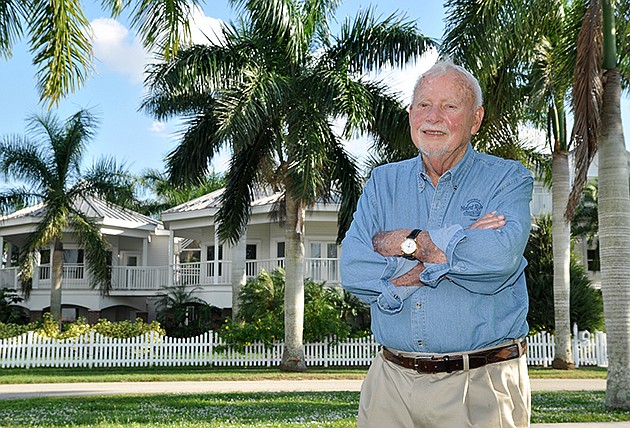- November 23, 2024
-
-
Loading

Loading

Over six decades in the building industry, Peter Taylor survived booms and busts, fought back against corruption and learned how to deal with the constant challenges of construction.
From a start at a lumberyard, he went on to be a senior vice president with Levitt & Sons — the powerhouse company that revolutionized suburban homebuilding in the 1950s and beyond. He later started his own firm, Taylor Contractors of Florida, which built thousands of homes in the region, medical facilities statewide and several Charlotte County landmarks.
Taylor, 89, recently wrote a book about his life, “The People's Contractor: My Life in the American Building Industry.” The Business Observer sat down with the retired Punta Gorda builder to talk about his career, experiences and lessons learned. Here are excerpts of the conversation:
Stay focused: Taylor graduated from The Citadel in 1950 and went to work for a lumberyard in Brooklyn. It paid $50 a week. “I had almost two years in the Marine Corps and a degree in business, and I just walked out the door and here's a job, at $50 a week,” says Taylor. “'Wow,' I thought, 'See, it all pays.' A year later they gave me $60 a week and a year later they gave me $70.”
Innovative mind: Taylor got married in 1953 and he and his wife rented an apartment in New York. Says Taylor: “It was $84 a month, a one-room apartment plus a bathroom and Pullman kitchen.”
But parking was scarce. There was space for 60 cars, but there were 500 tenants. “I got tired of renting a space down at the gas station a quarter-mile away and running back in the snow or rain,” he says. “There was a vacant piece of property next to the apartment. I made a deal with the storage company that owned the property and I graded it, lighted it and put some drainage in, all for $2,500. It's amazing what you could do back in those days for a little bit of money.”
Big time: Taylor started working for Levitt & Sons in New York, the prominent developer. He was working as a superintendent for another builder, which was about to compete with Levitt on some projects. “I said goodbye,” says Taylor, “because Levitt was going to eat them alive.”
Levitt named Taylor a vice president a year later, he says, and within eight years he was a senior vice president.
Rule stickler: Taylor took his job to oversee policy at Levitt & Sons as seriously as a U.S. Marine. Like the time he enforced the rule that no employee can accept a gift that costs more than $25. “When I was elevated to senior vice president, I was in the company's headquarters building at Christmastime,” says Taylor “and they came in with hand trucks with cases of booze.
“I sent out a letter to everyone who worked for me, every subcontractor, every utility. I said that I know it's customary in the construction industry to express your gratitude for the work we give you. But if we did our job correctly, you can't afford to give us Christmas presents, because we've got you tightened down. So you may not give any to anyone, and if you do, that will indicate to us that you want special treatment, and you're not going to get it. In fact, we don't want to do business with you anymore.
“I sent out the letter and posted the letter on the entrance of our office building. It's called my Scrooge letter. And it worked.”
Sunny days: Taylor ran construction in eight states plus Montreal at Levitt. But the rain and cold eventually drove him south, to Florida. “I came down here without a job,” he says. “I was the hotshot from New York. And I hadn't read the newspapers, which showed that Florida was in a recession since 1972. And I came down in 1975.”
Work load: Taylor Contractors of Florida was in business from 1975 to 2009, and Taylor worked until he was 84. The firm partnered with General Development Corp. in the 1970s and 1980s on at least 12,000 condos and single-family homes. “We worked as a general contractor or as a carpentry contractor,” recalls Taylor. “We would frame and truss out the structure, put the fascia and soffits on, install the windows and doors and do the interior trim. It was about 70% of the house. We were doing 70 houses a week. We bought plywood by the carload, drywall by the carload.”
Passion play: Taylor lives by the saying that “if you like what you're doing, you don't have to work for the rest of your life.” Never allow money, says Taylor, to be the driving force in a career choice. “The driving force should be I love this job,” he says. “And I loved construction. I miss that job.”